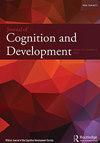Evidence-Based Practices in a Social Project: Promotion of Executive Functions in Children from Northeastern Brazil
IF 2.1
2区 心理学
Q3 PSYCHOLOGY, DEVELOPMENTAL
引用次数: 0
Abstract
ABSTRACT Evidence points to the possibility of promoting executive functions (EF) through school interventions. Little is known, however, about the effectiveness of this type of intervention in situations of social vulnerability. This study investigated the effectiveness of an EF intervention program applied with a sample of preschool children, in a situation of socioeconomic vulnerability, assisted by a non-governmental organization (NGO) in northeastern Brazil. Participants were 46 children (mean age = 4.67 years; SD = 0.71), divided into experimental (EG = 25) and control (CG = 21) groups. The children were assessed before and after the intervention regarding measures of EF and behavior indices. The intervention was applied over 3 months by two professionals from the NGO. There was no group x moment interaction effect on the performance measure used, however, fewer difficulties were observed posttest in the EG in relation to the CG, according to the informant-based measures. From the parents’ reports, difficulties in inhibitory control (IC) decreased in the EG. From the parents’ and teachers’ reports, difficulties in hyperactivity, conduct problems and behavior problems (BP) total indices also decreased in the EG. A simple mediation model suggested that gains in IC mediated the intervention impact on gains in BP as observed by the parents. Interventions in EF for socioeconomically vulnerable children can minimize the deleterious effects of poverty on neurocognitive development. This study shows the applicability and effects of this type of intervention in an educational context, within the scope of a community assistance social project, bringing neuropsychology and social requirements closer together.社会项目中的循证实践:促进巴西东北部儿童的执行功能
有证据表明,通过学校干预促进执行功能(EF)的可能性。然而,人们对这种干预在社会脆弱情况下的有效性知之甚少。本研究在巴西东北部的一个非政府组织(NGO)的协助下,对处于社会经济脆弱性的学龄前儿童样本进行了EF干预计划的有效性调查。参与者为46名儿童(平均年龄4.67岁;SD = 0.71),分为实验组(EG = 25)和对照组(CG = 21)。在干预前后对儿童进行EF测量和行为指标的评估。来自该非政府组织的两名专业人员进行了为期3个月的干预。没有组x力矩交互作用对所使用的性能测量的影响,然而,根据基于信息的测量,与CG相关的EG测试后观察到的困难较少。从家长报告来看,EG的抑制性控制(IC)困难有所减少。从家长和老师的报告来看,EG的多动困难、品行问题和行为问题(BP)总指标也有所下降。一个简单的中介模型表明,父母观察到,IC的增加介导了干预对BP增加的影响。对社会经济弱势儿童的EF干预可以最大限度地减少贫困对神经认知发展的有害影响。这项研究显示了这种类型的干预在教育背景下的适用性和效果,在社区援助社会项目的范围内,将神经心理学和社会需求更紧密地联系在一起。
本文章由计算机程序翻译,如有差异,请以英文原文为准。
求助全文
约1分钟内获得全文
求助全文
来源期刊

Journal of Cognition and Development
Multiple-
CiteScore
4.00
自引率
0.00%
发文量
29
期刊介绍:
The Journal of Cognition and Development is the official journal of the Cognitive Development Society (CDS). Some CDS members are concerned with basic research or theory; others focus on policy issues and practical applications. The range of interests includes cognitive development during all stages of life, and we seek to understand ontogenetic processes in both humans and nonhumans. Finally, their interests encompass typical as well as atypical development, and we attempt to characterize both biological and cultural influences on cognitive change and continuity.
 求助内容:
求助内容: 应助结果提醒方式:
应助结果提醒方式:


